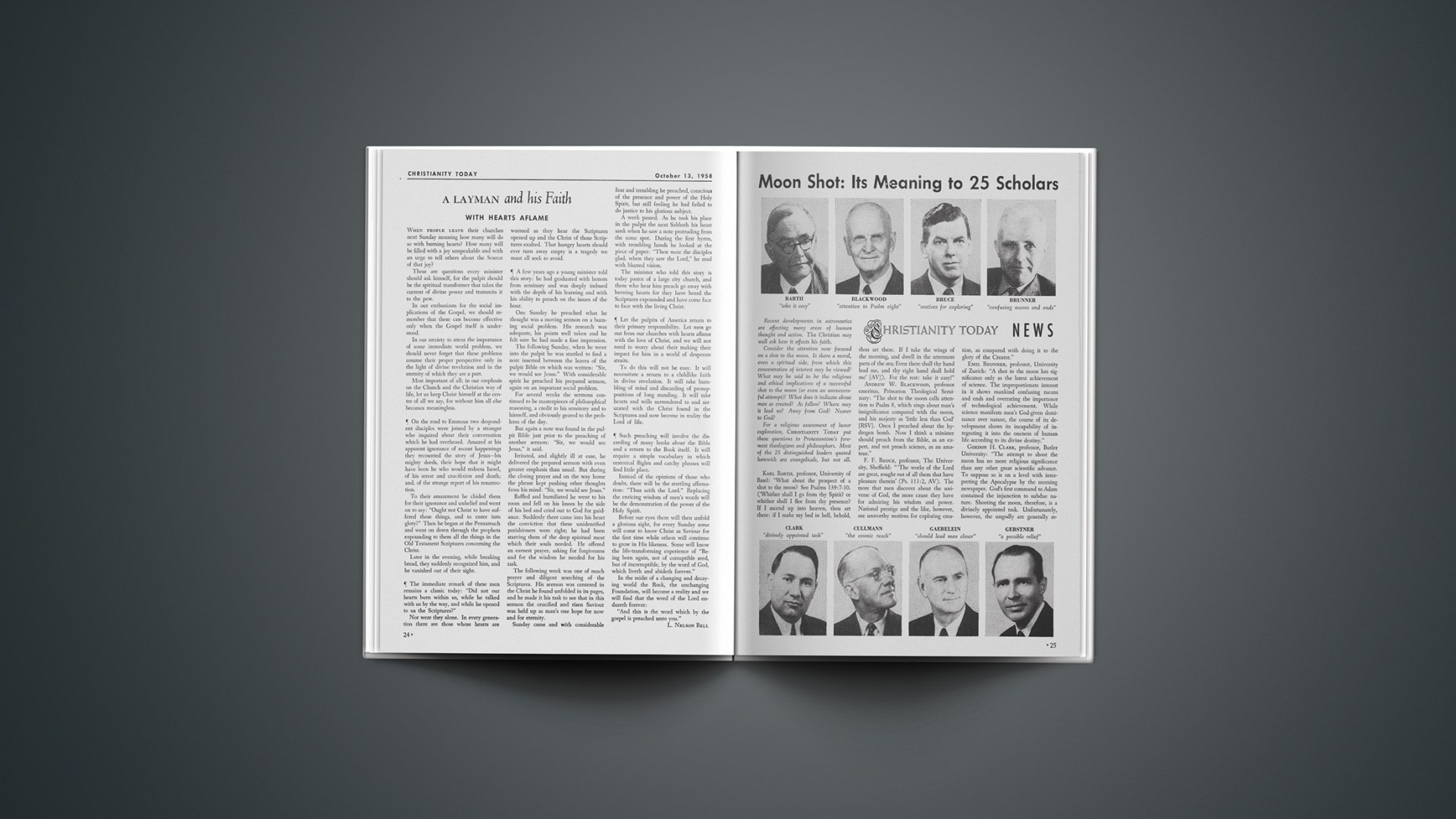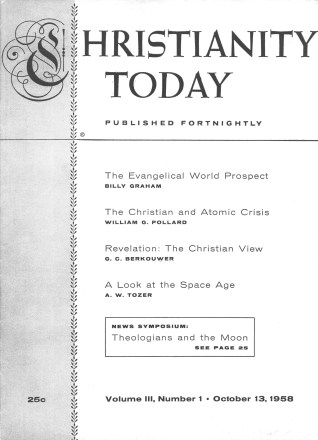When people leave their churches next Sunday morning how many will do so with burning hearts? How many will be filled with a joy unspeakable and with an urge to tell others about the Source of that joy?
These are questions every minister should ask himself, for the pulpit should be the spiritual transformer that takes the current of divine power and transmits it to the pew.
In our enthusiasm for the social implications of the Gospel, we should remember that these can become effective only when the Gospel itself is understood.
In our anxiety to stress the importance of some immediate world problem, we should never forget that these problems assume their proper perspective only in the light of divine revelation and in the eternity of which they are a part.
Most important of all; in our emphasis on the Church and the Christian way of life, let us keep Christ himself at the center of all we say, for without him all else becomes meaningless.
On the road to Emmaus two despondent disciples were joined by a stranger who inquired about their conversation which he had overheard. Amazed at his apparent ignorance of recent happenings they recounted the story of Jesus—his mighty deeds, their hope that it might have been he who would redeem Israel, of his arrest and crucifixion and death; and, of the strange report of his resurrection.
To their amazement he chided them for their ignorance and unbelief and went on to say: “Ought not Christ to have suffered these things, and to enter into glory?” Then he began at the Pentateuch and went on down through the prophets expounding to them all the things in the Old Testament Scriptures concerning the Christ.
Later in the evening, while breaking bread, they suddenly recognized him, and he vanished out of their sight.
The immediate remark of these men remains a classic today: “Did not our hearts burn within us, while he talked with us by the way, and while he opened to us the Scriptures?”
Nor were they alone. In every generation there are those whose hearts are warmed as they hear the Scriptures opened up and the Christ of those Scriptures exalted. That hungry hearts should ever turn away empty is a tragedy we must all seek to avoid.
A few years ago a young minister told this story: he had graduated with honors from seminary and was deeply imbued with the depth of his learning and with his ability to preach on the issues of the hour.
One Sunday he preached what he thought was a moving sermon on a burning social problem. His research was adequate, his points well taken and he felt sure he had made a fine impression.
The following Sunday, when he went into the pulpit he was startled to find a note inserted between the leaves of the pulpit Bible on which was written: “Sir, we would see Jesus.” With considerable spirit he preached his prepared sermon, again on an important social problem.
For several weeks the sermons continued to be masterpieces of philosophical reasoning, a credit to his seminary and to himself, and obviously geared to the problems of the day.
But again a note was found in the pulpit Bible just prior to the preaching of another sermon: “Sir, we would see Jesus,” it said.
Irritated, and slightly ill at ease, he delivered the prepared sermon with even greater emphasis than usual. But during the closing prayer and on the way home the phrase kept pushing other thoughts from his mind: “Sir, we would see Jesus.”
Baffled and humiliated he went to his room and fell on his knees by the side of his bed and cried out to God for guidance. Suddenly there came into his heart the conviction that these unidentified parishioners were right; he had been starving them of the deep spiritual meat which their souls needed. He offered an earnest prayer, asking for forgiveness and for the wisdom he needed for his task.
The following week was one of much prayer and diligent searching of the Scriptures. His sermon was centered in the Christ he found unfolded in its pages, and he made it his task to see that in this sermon the crucified and risen Saviour was held up as man’s one hope for now and for eternity.
Sunday came and with considerable fear and trembling he preached, conscious of the presence and power of the Holy Spirit, but still feeling he had failed to do justice to his glorious subject.
A week passed. As he took his place in the pulpit the next Sabbath his heart sank when he saw a note protruding from the same spot. During the first hymn, with trembling hands he looked at the piece of paper: “Then were the disciples glad, when they saw the Lord,” he read with blurred vision.
The minister who told this story is today pastor of a large city church, and those who hear him preach go away with burning hearts for they have heard the Scriptures expounded and have come face to face with the living Christ.
Let the pulpits of America return to their primary responsibility. Let men go out from our churches with hearts aflame with the love of Christ, and we will not need to worry about their making their impact for him in a world of desperate straits.
To do this will not be easy. It will necessitate a return to a childlike faith in divine revelation. It will take humbling of mind and discarding of presuppositions of long standing. It will take hearts and wills surrendered to and saturated with the Christ found in the Scriptures and now become in reality the Lord of life.
Such preaching will involve the discarding of many books about the Bible and a return to the Book itself. It will require a simple vocabulary in which oratorical flights and catchy phrases will find little place.
Instead of the opinions of those who doubt, there will be the startling affirmation: “Thus saith the Lord.” Replacing the enticing wisdom of men’s words will be the demonstration of the power of the Holy Spirit.
Before our eyes there will then unfold a glorious sight, for every Sunday some will come to know Christ as Saviour for the first time while others will continue to grow in His likeness. Some will know the life-transforming experience of “Being born again, not of corruptible seed, but of incorruptible, by the word of God, which liveth and abideth forever.”
In the midst of a changing and decaying world the Rock, the unchanging Foundation, will become a reality and we will find that the word of the Lord endureth forever:
“And this is the word which by the gospel is preached unto you.”










